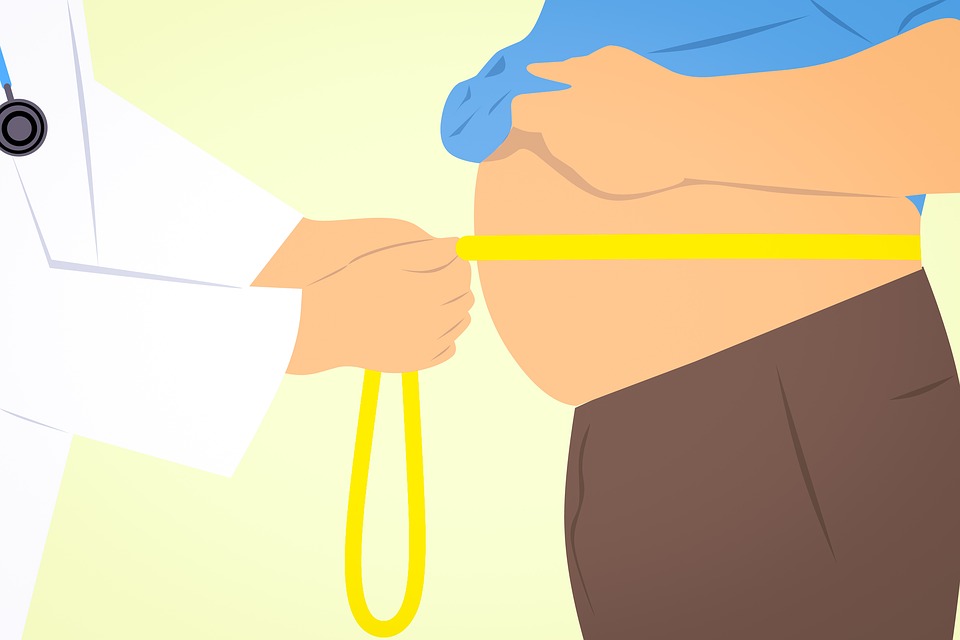
Carrying too much weight and obesity collectively account for one of the primary avoidable causes of mortality in America. Being overweight for an extended period of time can be a serious medical problem that can have long-term ramifications for your well-being.
Having a high weight can denote surplus body mass, and obesity pertains to having a great deal of extra fat in the body. Carrying too much weight increases your chances of health issues. Conditions such as coronary heart disease, type 2 diabetes, asthma, elevated cholesterol, osteoarthritis, hypertension, sleep apnea, and certain forms of cancer can result from these factors.
Experts in the field of public health concur that the amount of overweight and obese individuals has ballooned to a massive degree both here and in foreign nations. More than a third of U.S. adults are obese. Elderly people are more likely to have obesity compared to younger adults, as seen from the recent National Health and Nutrition Examination Survey. And the problem also affects children. Roughly one out of five American kids and adolescents aged 2 to 19 are obese.
Is obesity defined by your weight?
Medical personnel frequently utilize the Body Mass Index to describe excessive weight in public. The Body Mass Index calculates how much an average person’s weight is when compared to their height. Generally, healthcare professionals consider a Body Mass Index of 30 or more to be indicative of obesity. Although BMI does not provide a complete picture, it is possible to measure it simply and it can serve as a warning for health issues associated with being overweight.
Athletic individuals, such as bodybuilders and athletes, demonstrate limitations in using BMI to assess health as they can have a higher score even though their body fat percentages are low. One might be obese even when their weight is considered normal. If your body mass index is within the normal range but your level of body fat is too high, you may suffer from the same health issues as someone with a higher body mass index.
Medical professionals have noticed that different ethnicities have varying thresholds for the amount of extra weight they can carry before it begins to have an impact on their health. For instance, Asians are in danger of having health issues at a BMI lower than the average, while individuals with African heritage are more likely to experience health risks with a higher BMI.
Checking waist circumference is another way to determine obesity. Having an increased amount of fat stored around your waist puts you in a higher danger of acquiring obesity-related health issues. For people assigned female at birth, the danger becomes alarmingly great when the circumference of their waist is more than 35 inches. However, for those who have been identified as male at birth, the risk is substantial if the waist size is more than 40 inches.
How does obesity affect my body?
Obesity affects your body in many ways. The effects of having extra body fat can be simply mechanical. An illustration of this would be that there is a definite distinction between carrying excess weight on your body and the resultant strain on your bones and joints. The more subtle impacts can include biochemical modifications in the bloodstream that can result in an increased potential for developing diabetes, heart disease, and/or stroke.
Some effects are still not well understood. Obesity can contribute to a heightened danger of developing certain types of cancers. We don’t know why, but it exists. The data shows that being obese raises your chances of passing away earlier than expected from any source. Research indicates that you can significantly reduce the possibility of health problems by simply losing 5 to 10 percent of your current weight.
Metabolic changes
The process of changing calories into energy that your body uses to function is your metabolism. When your body takes in more calories than it needs, it changes the excess calories into lipids and stores them in your fat cells. When you don’t have any more tissue to store fat in, your fat cells grow bigger. Fat cells become bigger and secrete hormones and other substances that can lead to inflammation.
Chronic inflammation has many adverse health effects. It can have an impact on your metabolism due to causing insulin resistance. This implies that your body is unable to utilize insulin effectively to reduce the levels of blood sugar and fat content in your blood. An elevated level of blood sugar and fats like cholesterol and triglycerides can lead to hypertension.
These risk factors joined forces are referred to as metabolic syndrome. The reason they are assembled together is because what they have in common encourages each other. They contribute to additional obesity and make it more difficult to shed pounds and keep weight off. Metabolic syndrome is a common factor in obesity and contributes to many related diseases, including:
- Type 2 diabetes. Obesity specifically raises the risk of Type 2 diabetes seven-fold in people assigned male at birth and 12-fold in people assigned female at birth. The risk increases by 20% for every additional point you gain on the BMI scale. It also diminishes with weight loss.
- Cardiovascular diseases. High blood pressure, high cholesterol, high blood sugar, and inflammation are all risk factors for cardiovascular diseases, including coronary artery disease, congestive heart failure, heart attack, and stroke. These risks increase hand-in-hand with your BMI. Cardiovascular disease is the leading cause of preventable death worldwide and in the U.S.
- Fatty liver disease. Excess fats circulating in your blood make their way to your liver, which is responsible for filtering your blood. When your liver begins storing excess fat, it can lead to chronic liver inflammation (hepatitis) and long-term liver damage (cirrhosis).
- Kidney disease. High blood pressure, diabetes, and liver disease are among the most common contributors to chronic kidney disease.
- Gallstones. Higher blood cholesterol levels can cause cholesterol to accumulate in your gallbladder, leading to cholesterol gallstones and potential gallbladder diseases.
Direct effects
Having too much fat in the body can restrict the organs of the respiratory apparatus and result in the straining of your muscles and bones. This contributes to:
- Asthma.
- Sleep apnea.
- Obesity hypoventilation syndrome.
- Osteoarthritis.
- Back pain.
- Gout.
According to the U.S. One-third of adults who are classified as obese also have arthritis, according to the Centers for Disease Control and Prevention. Research has demonstrated that for every 5 kilograms gained in weight, the chance of developing knee arthritis rises by 36%. It is possible to alleviate discomfort associated with arthritis by dropping 10% of your weight in combination with exercise. Taking these steps can also enhance the quality of your life.
Indirect effects
Obesity is also associated indirectly with:
- Memory and cognition, including a heightened risk of Alzheimer’s disease and dementia.
- Female infertility and pregnancy complications.
- Depression and mood disorders.
- Certain cancers, including esophageal, pancreatic, colorectal, breast, uterine, and ovarian.
What causes obesity?
In many ways, obesity is a puzzling disease. Experts are uncertain about how the body manages and controls body weight and fat. It is established that when someone consumes more calories than they burn, they will put on weight.
The elements that contribute to obesity can be complicated. The factors that contribute to your overall health typically include hereditary components, financial status, metabolic rate, and personal lifestyle preferences. Weight can be impacted by certain endocrine diseases, disorders, and medications.
Factors that may affect obesity include the following.
Genetics
Research suggests that the risk of being obese is often passed on from one generation to the next through hereditary genetic factors. Investigators have established a connection between some genes and being overweight. Genes may have an influence on where extra fat is stored in the body. Most researchers believe that it will require more than one gene to be responsible for an obesity crisis. Scientists are carrying on with their work to gain a deeper comprehension of the manner in which genes and habits influence the development of obesity. Families have the opportunity to spend time together by eating meals together and participating in other activities, which can be influenced by the environment they live in and their lifestyle.
Metabolism factors
The manner in which your body obtains energy is dissimilar from a different person’s approach to it. The rate of metabolism and hormone levels vary between individuals, and these elements have an influence on the amount of weight gain. An instance of this is ghrelin, the “appetite controller” that is responsible for appetite. Researchers have found that ghrelin may help trigger hunger. Another hormone called leptin can decrease appetite. An illustration of this is PCOS (polycystic ovary syndrome) which is a problem in female individuals that is caused by an overabundance of particular hormones. A higher propensity for obesity is common among women who have Polycystic Ovary Syndrome.
Socioeconomic factors
The amount of money earned could impact one’s likelihood of having obesity. This is especially true for women. Girls in lower socio-economic brackets tend to have a higher occurrence of obesity than those from more affluent backgrounds. This is especially true among minority groups.
Lifestyle choices
Consuming too much food and not getting enough physical activity can both lead to being overweight. But you can change these lifestyle choices. If a large portion of your daily diet consists of processed foods or foods rich in sugar or fat, you will likely see an increase in your weight. If you don’t engage in physical activity much if at all, it will be difficult for you to reduce or keep up a healthy weight.
Medicines
Prescribed drugs such as corticosteroids, antidepressants, and antiseizure medicines may lead to an increase in body weight.
Emotions
Engaging in eating as a coping mechanism when one is feeling emotionally drained or disheartened can result in an increase in weight. Too little sleep may also contribute to weight gain. Those who get fewer than 5 hours of sleep a night have a higher chance of putting on weight than those who get 7 to 8 hours of snoozing.
How is obesity diagnosed?
At your appointment, your doctor will calculate your weight, height, and the size of your waist.
When visiting your doctor, it is important to give them all the details regarding your medical history. They will inquire about any prior medical concerns, drugs taken, and alterations in your body weight. The medical provider is likely to inquire concerning your existing dietary habits, hours of sleep, physical activity, sources of tension, and any prior weight loss efforts. They may ask about your biological family’s health history.
The physicians will evaluate your essential functions by conducting a heartbeat and blood pressure assessment and audibly listening to your heart and lungs. A blood test could be performed to measure your blood sugar and cholesterol amounts, as well as to identify any issues with hormones. This entire profile will be utilized to analyze your obesity and any associated ailments that you might have.
How is obesity treated?
A full overview of your health condition will be used to decide on an appropriate course of treatment. The medical professional you are seeing will first address your most immediate health concerns, then will create a long-term plan for you to lose weight. Occasionally, they may be able to suggest alterations that can result in rapid outcomes, such as changing your drugs. The entire strategy of handling the situation will proceed slowly and likely include a variety of elements. It may take some experimentation to discover which treatment methods are most successful for you, as everyone is unique. Research has shown that team-based weight-loss plans accompanied by regular, meaningful contact between patient and doctor are the most successful in helping individuals to both shed pounds and maintain that weight loss.
Your treatment plan may include:
Dietary changes
The specific diet modifications that are necessary for you to shed pounds will be unique to your own circumstances. Some individuals may reap rewards from reducing the amount of food they eat in one sitting or snacking between meals. For some, the main factor of weight control may be adjusting their diet choices rather than cutting down on portion sizes. Almost everyone can benefit from eating more plants. Foods such as fruits, vegetables, whole grains, and legumes usually contain less fat and more fiber, and essential vitamins and minerals. Eating foods that are higher in nutritional value can lead to feeling fuller and more content while consuming fewer calories.
Increased activity
It is generally agreed that proper nutrition and physical activity are essential for successful weight reduction and keeping the weight off. But exercise doesn’t have to mean a gym membership. Going for a leisurely stroll is one of the most effective ways of losing weight. Healthcare professionals advise exercising for a minimum of thirty minutes five days a week. Taking a stroll every day during lunch break or before/after work can have a noticeable impact.
Behavioral therapies
Seeking help through counseling, attending support groups, and trying cognitive behavioral therapy may be helpful in reaching your goals for weight loss. These techniques can assist in reprogramming your brain to encourage advantageous shifts. They can also aid you in controlling your stress levels and dealing with the psychological and emotional issues that could be causing problems for you. The effects of weight and attempts to reduce it have a far-reaching impact on us, thus it can be advantageous to have both moral and practical backing during this time.
Medication
Your healthcare provider may suggest taking medications along with other types of treatment. Drugs are not the solitary answer to shedding pounds, but they can assist in attacking the issue from a different direction. As an illustration, appetite suppressants can disrupt some of the routes that lead to your brain that influence your hunger. This might not make up much of the jigsaw to certain individuals, but it could be a more substantial portion for others.
Common FDA-approved drugs for treating obesity include:
- Orlistat (Xenical®, Alli®): Reduces absorption of fat from your gut.
- Phentermine (Adipex-P®, Lomaira®, Suprenza®): Decreases your appetite. It’s approved for use for three months at a time.
- Benzphetamine (Didrex®, Regimex®): Decreases your appetite.
- Diethylpropion (Depletite # 2®, Radtue®, Tenuate®): Decreases your appetite.
- Phendimetrazine (Bontril®, Melfiat®): Decreases your appetite.
- Bupropion-naltrexone (Contrave®): May reduce cravings and food intake.
- Liraglutide (Saxenda®): Reduces appetite and slows digestion.
- Semaglutide (Wegovy®): Suppresses appetite.
- Cellulose and citric acid (Plenity®): Makes you feel full.
- Lisdexamfetamine dimesylate (Vyvanse®): Helps manages symptoms of binge eating disorder.
- Phentermine-topiramate (Qsymia®): Makes you less hungry.
- Combination of SGLT2 inhibitors and glucagon-like-1 receptor agonists.
Weight loss surgery
If you have been identified as having class III obesity, it is possible for you to undergo bariatric surgery. Surgical intervention is an intense option, but it can yield notable and enduring results when it comes to weight loss. It produces results by altering your physiology rather than merely adjusting your thought process or behaviors. Any form of bariatric surgery will change how your digestive system works. They limit how many calories you can eat and absorb. Impacts on hormones in your digestion system modify your metabolism and appetition.
Bariatric surgery procedures include:
- Gastric sleeve (sleeve gastrectomy).
- Gastric band (LAP band).
- Gastric bypass (Roux-en-Y).
- Duodenal switch.














